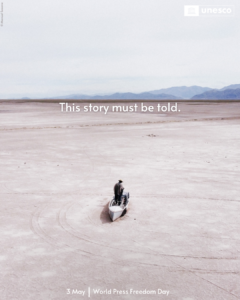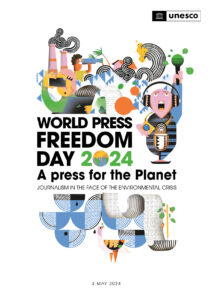A large majority – more than 70% – of journalists around the world reported being targeted by attacks, threats or pressure when covering environmental issues. Of these, 41% said they were victims of physical attacks.
This is according to a survey by UNESCO and the International Federation of Journalists (IFJ), the results of which were released on May 3, World Press Freedom Day.

The UNESCO campaign for the 2024 World Press Freedom Day: "This Story must be Told." The image shows Lake Poopó in Bolivia, which was declared disappeared in 2015.
“A Press for the Planet: journalism in the face of the environmental crisis” is the topic chosen for this year’s global conference in Santiago, Chile that marks this special day. It will focus on, among other topics, the safety of environmental journalists, how to confront denial and disinformation about climate change.
“In this 31st edition of World Press Freedom Day, UNESCO emphasizes the twofold challenge we have as humans at this moment: saving our democratic institutions and saving the planet. For this reason, this year's theme seeks to debate the relationship between freedom of expression and the environmental crisis that we are experiencing," Guilherme Canela, head of the Freedom of Expression and Safety of Journalists section of Journalists at UNESCO, told LatAm Journalism Review (LJR).
“Journalists are fundamental actors in informing our societies about the various angles of the environmental crisis, including climate change, combating the brutal levels of disinformation we have on these issues. They are also central to holding the powerful to account on environmental issues. And these journalists – those who cover the environment – are under attack,” Canela added.
These attacks are reflected in the study “Press and planet in danger,” published this May 3, which through qualitative and quantitative analysis details assaults against journalists who cover environmental issues.
One of the elements of the study was the survey carried out by UNESCO and the IFJ with 905 journalists from 129 countries who cover environmental issues. About 16% work in Latin America and the Caribbean.
In addition to physical attacks, threats and other types of pressure, of the 70% of journalists who reported being attacked, 60% said they had experienced online harassment. A quarter of those who said they were attacked said it was legal in nature.
Nearly half of respondents said they had practiced self-censorship, with reasons ranging from “fear of potential attacks, having their sources exposed to harm, and being aware that their environmental coverage could conflict with the interests of their employers or advertisers,” according to the study.
The survey also emphasizes the figures referring to women journalists. There were 371 who responded to the survey. Eighty percent of women journalists who reported having received some type of attack said that they received psychological threats or pressure for their coverage.
Likewise, they were victims of digital attacks more frequently than their male colleagues: 62% were targeted with this kind of attack. This figure coincides with another UNESCO report, “The Chilling,” which identified that women journalists are more prone to digital violence than men.
Among those women journalists attacked, 83% said it affected their mental health. A figure higher than the general statistic found in the survey, which was 75%.
Disinformation related to climate change was also analyzed by the survey. Two-thirds of those who responded pointed out that disinformation has increased in recent years, but said that journalism is not doing enough to counteract it. Of those, 68% believe this is related to conflict of interest issues with stakeholders.
Another element of the study has to do with the figures recorded by UNESCO during the last 15 years (from 2009 to 2003) regarding attacks on journalists who cover environmental issues.
The UN agency recorded that at least 749 journalists, groups of journalists and media reporting on environmental issues have been attacked in 89 countries in that period. The study notes that state actors, such as police, military forces, government officials and employees, have committed at least half of them. On the other hand, private actors, including companies from extractive industries, illegal groups, protesters and local communities, are responsible for at least a quarter of these attacks.

UNESCO Banner World Press Freedom Day 2024
UNESCO highlighted the 44 journalists who covered environmental issues and who were murdered in the last 15 years, from 2009 to 2023. The organization also has in its records 24 journalists who survived murder attempts in that same period.
The topics covered by those who were attacked during the 15-year period include the causes of climate change, illegal mining, deforestation and fossil fuels, as well as issues specific to communities, such as agribusiness, land grabs, infrastructure megaprojects and consequences of extreme weather events.
Reporting on environmental demonstrations is also a favorable scenario for attacks on media. UNESCO found 194 attacks during protest coverage, mainly in Latin America and the Caribbean, North America and Europe.
Legal actions against journalists and media also worry UNESCO. At least 204 of them have had to face these kinds of attacks in the last 15 years. Criminal charges against media outlets and journalists, imprisoned reporters and even defamation lawsuits make up the attacks targeting those who report on environmental issues.
The UNESCO study ends with recommendations to governments, media and journalists, as well as defense organizations. For Canela, one of the most important aspects is the commitment on the part of States to guarantee journalistic work.
“All actors, mainly public authorities, urgently have to protect all journalists. Without that, our societies will not have access to verified information to face the current environmental crisis,” Canela said.
The main conference for World Press Freedom Day takes place from May 2 to 4 in Chile. Different activities are planned around the world within the framework of this commemoration.
On May 2, the UNESCO/Guillermo Cano World Press Freedom Prize was awarded, which this year was given to Palestinian journalists covering the Gaza conflict.